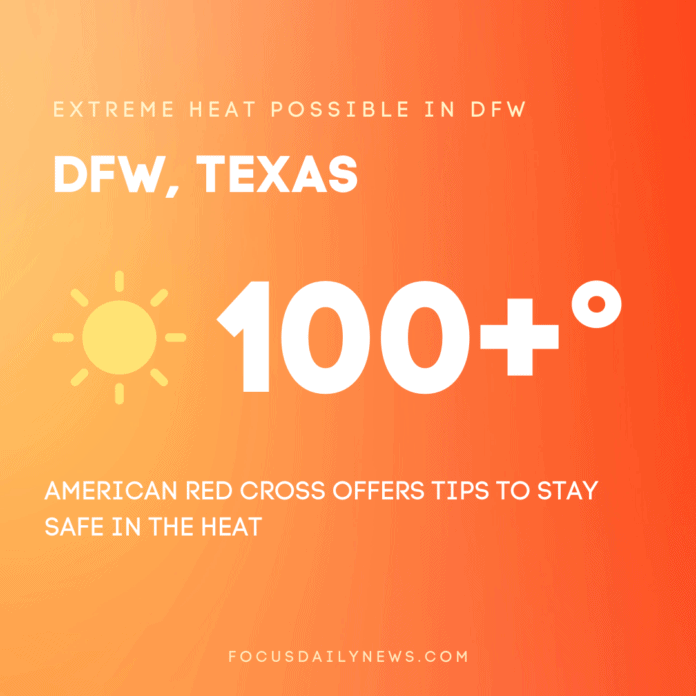DALLAS/FORT WORTH (July 23, 2021) – The American Red Cross North Texas Region reminds North Texans that next week may bring the highest temperatures we’ve seen this summer. A little preparation can go a long way in helping to keep you, your family and your fur babies safe during intense heat.
EXTREME HEAT CONDITIONS
As with severe weather there are several key terms that you need to pay close attention to so that you and those you care about can stay safe or know when to call and ask for help.
Extreme Heat Watch is issued if the potential for extreme heat could occur within the next 24-72 hours.
Extreme Heat Advisory is issued if the forecasted Heat Index is expected to hit 100 degrees. This type of weather condition increases the potential for heat related illness.
Extreme Heat Warning is issued if the forecasted Heat Index is expected to hit or exceed 105 degrees. This type of weather condition significantly increases the potential for heat related illness.
Spending too much time or over-doing it in extreme heat and humidity makes it hard for our bodies to stay cool. When our bodies can’t cool down enough, we can suffer from heat-related illness.
Young children, older adults, individuals with chronic medical conditions such as heart disease, individuals taking prescription medicines, outside workers, and those who live alone are more susceptible to the heat and are at greater risk of experiencing a heat-related illness.
HEAT RELATED ILLNESS
Heat Cramps – the mildest heat-related illnesses, are involuntary muscle spasms and pain that usually occur in the arms, legs, and stomach.
Heat Exhaustion – is more severe than heat cramps and affects the entire body, not just your muscles. Heat exhaustion occurs when your body is unable to cool itself.
Heat Stroke – is the most dangerous of all heat-related illnesses. It develops when the body’s systems are overwhelmed by heat and stop functioning – usually because the signs of heat exhaustion are ignored. Heat stroke can lead to permanent damage of your body’s organs and can be life-threatening.
5 TIPS TO STAY SAFE DURING EXTREME HEAT
Stay Aware – watch weather warnings and adhere to the safety precautions. NEVER leave children or pets in your vehicle.
Keep Cool – if you do not have a working air conditioner, seek relief during the hottest part of the day in places such as libraries, theaters or malls.
Stay Hydrated – drink plenty of fluids, even if you do not feel thirsty. Avoid drinks with alcohol or caffeine.
Limit Outdoor Activity – avoid strenuous exercise during the hottest part of the day and wear loose-fitting, lightweight and light-colored clothing.
Stay Connected – check on friends, family and elderly neighbors who may not have air conditioning or live alone.
More tips and tools on how to prepare for extreme heat and resources on providing assistance to someone impacted by heat-related illness can be found in the free Red Cross Emergency App.













